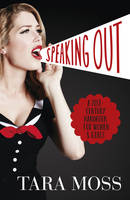Tara Moss has worn many hats — model, crime writer, journalist, and now author of two non-fiction titles, The Fictional Woman and Speaking Out. Where The Fictional Woman is part-memoir, Speaking Out is designed as a handbook for woman and girls, full of practical tips on how to speak out and how to deal with the backlash if you do. There's a whole section on surviving social media (don't let the trolls get you down), which unfortunately gets more relevant every day.
So why did a crime writer choose to write a nonfiction book that isn't about death? Well, she says, here's a powerpoint presentation I prepared earlier. There followed twenty minutes of increasingly depressing statistics about the lack of voice and representation of women in media and politics. Suffice it to say, we can do better. (Except Canada, phwoar: fifty/fifty representation in parliament! Be still my beating heart.)
When we are silent or unheard our ideals and perspectives, our needs, our pain, and our struggles remain unknown or unacknowledged; and often for this reason, unchanged. — Tara Moss
This just emphasises what I've been hearing from many of the other panels. If we don't hear indigenous voices, if we don't hear LGBT voices, then we're not representing our society. As someone who's been nosy all her life I've never quite understood why we haven't figured this out yet. Listening's not that hard, is it? We might learn something.
The reality is not that women talk more ... but that we want and expect them to talk less. — Soraya Chemaly
Oh, right. That's why. Even about issues that you'd expect women to have an equal say — birth control, parental leave, women's rights — we're still deferring to male opinion. And let's not even talk about violence against women. No wait, let's. Did you know a woman dies almost every week in Australia at the hands of a current or former partner? Did you know one out of five women experiences sexual violence, worldwide? That violence against women and girls remains unchanged despite a downward trend in all other crime?
 This can all seem incredibly depressing (it is), but at least things have changed since the 20th century. We can improve this situation; it's not static, it's not just the way things are.
This can all seem incredibly depressing (it is), but at least things have changed since the 20th century. We can improve this situation; it's not static, it's not just the way things are.
The more we speak out, the less easy it will be to silence others ... Toxic silence does a lot more damage than oversharing; silence has never solved anything. — Tara Moss
So here's your homework: read Speaking Out. Speak out more, and listen to those who are already. Comment on this post. Tell your own story. Once we have an equal voice, everyone will be better off.
See more photos of Tara Moss and her fact-filled presentation on our Flickr.




Add a comment to: Speaking Out: Tara Moss — WORD Christchurch